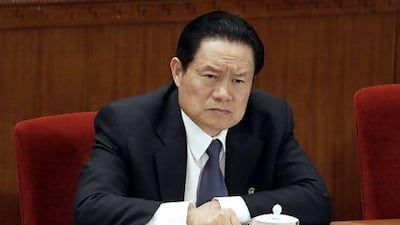A widening corruption scandal at China's top oil company claims victims of increasing seniority. Now it may even engulf the man who was recently the country's third-most powerful. But is this a straightforward case of law enforcement? And what does it tell us about the business model of Chinese state oil firms, which until recently seemed to be sweeping all before them?
On August 26, it was announced that Wang Yongchun, the deputy general manager of China National Petroleum Corporation (CNPC) was being investigated for "gross violation of party discipline", usually a euphemism for corruption. The next day, three other senior company officials were sacked. CNPC's listed companies in Hong Kong lost HK$21.7 billion (Dh10.3bn) in market value in a day.
The investigation went higher up - next drawing in the former CNPC chairman Jiang Jiemin, one of the Chinese Communist Party's top 200 members, its central committee then reportedly implicating Zhou Yongkang. Mr Zhou was probably China's third most powerful person when he ran the internal security services from 2007-12, and US diplomatic cables identified him as controlling the state oil monopoly.
Some of the allegations concern the use of outside contractors, run by cronies who could receive lucrative deals and pay kickbacks. But this is not just a simple criminal matter. Mr Zhou was the patron not only of Mr Jiang, but also of the high flyer Bo Xilai, the disgraced former party boss of Chongqing. The fall of this faction suggests corruption allegations are a weapon to be wielded selectively.
This is not the first high-level corruption case in China's petroleum industry. In 2009, Chen Tonghai, the chairman of Sinopec, China's second-largest oil company, was given a suspended death sentence for taking bribes. Again, political motivations were suspected, as Mr Chen had angered senior officials with his handling of a fuel supply crisis.
Over the past decade, Chinese oil companies have been feared by competitors and courted by governments. They brought low costs, willingness to pay top yuan for reserves, and mobilisation of large workforces to build pipelines through hostile terrain. Above all, the lure of the world's largest energy market, and Chinese political support, were irresistible to governments as far afield as Khartoum, Baghdad, Luanda and Caracas.
For many, the Chinese state behemoths were seen as executing a Machiavellian plan devised in Beijing to secure resources for the hungry dragon, lock up global energy supplies and build a network of allies, not all of them flawless democracies. They were the most visible international face of China's "state capitalism", praised as more far-sighted than the West's volatile free markets.
But this latest episode suggests a much more complex reading. Yes, Chinese state oil companies execute national policy. Yes, they are professional and increasingly technically capable. But they are also vast bureaucracies with their own interests to defend, especially amid the sprawling old oilfields and company towns of Daqing or Shengli. They have to respond to short-term crises and the fickle winds of public opinion. And they are vital sources of political power and patronage for party rivals.
The apparent mission to pursue "strategic" national goals paradoxically makes corruption and politicking more likely. When there is no clear commercial benchmark for success, it is easier to justify grandiose white-elephant projects.
CNPC may emerge stronger and fitter from the current round of investigations. But will this be a mere reshuffling of personnel, or a more fundamental rethink about the outsize role of the state oil companies in China's economy and politics?
Robin Mills is head of consulting at Manaar Energy, and author of The Myth of the Oil Crisis and Capturing Carbon

Chinese oil giants bogged down by acute self-interest
Corruption has blighted state oil companies in China, reaching even the most senior levels.
Most popular today

